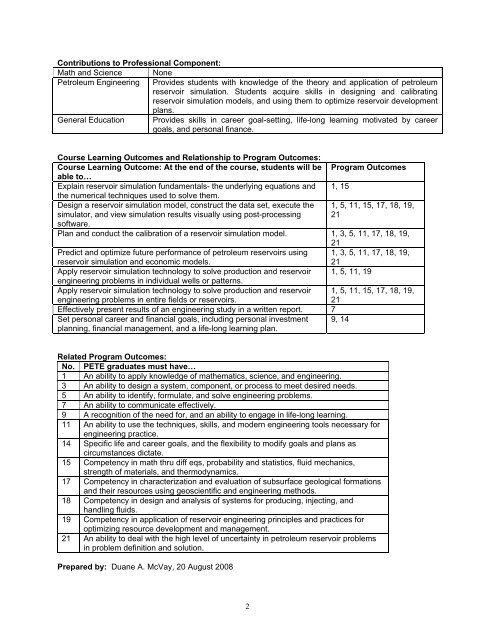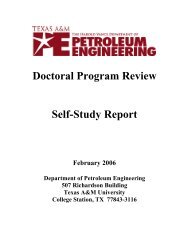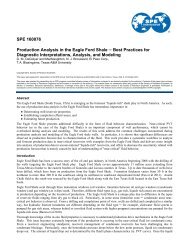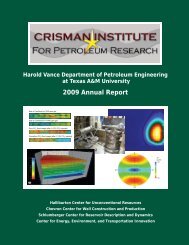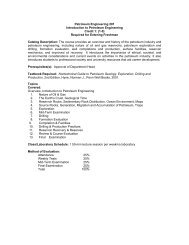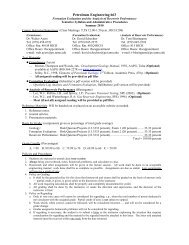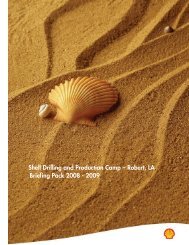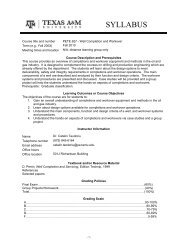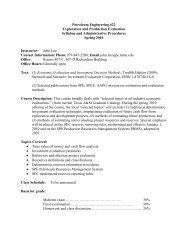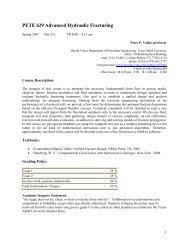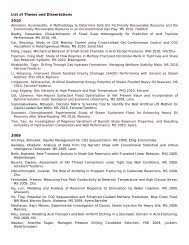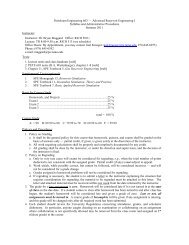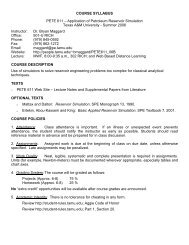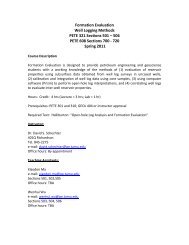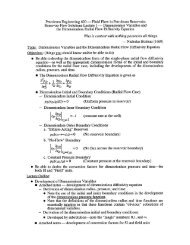Nontechnical Guide to Petroleum Geology, Exploration
Nontechnical Guide to Petroleum Geology, Exploration
Nontechnical Guide to Petroleum Geology, Exploration
Create successful ePaper yourself
Turn your PDF publications into a flip-book with our unique Google optimized e-Paper software.
Contributions <strong>to</strong> Professional Component:<br />
Math and Science None<br />
<strong>Petroleum</strong> Engineering Provides students with knowledge of the theory and application of petroleum<br />
reservoir simulation. Students acquire skills in designing and calibrating<br />
reservoir simulation models, and using them <strong>to</strong> optimize reservoir development<br />
plans.<br />
General Education Provides skills in career goal-setting, life-long learning motivated by career<br />
goals, and personal finance.<br />
Course Learning Outcomes and Relationship <strong>to</strong> Program Outcomes:<br />
Course Learning Outcome: At the end of the course, students will be<br />
able <strong>to</strong>…<br />
Explain reservoir simulation fundamentals- the underlying equations and<br />
the numerical techniques used <strong>to</strong> solve them.<br />
Design a reservoir simulation model, construct the data set, execute the<br />
simula<strong>to</strong>r, and view simulation results visually using post-processing<br />
software.<br />
Program Outcomes<br />
1, 15<br />
1, 5, 11, 15, 17, 18, 19,<br />
21<br />
Plan and conduct the calibration of a reservoir simulation model. 1, 3, 5, 11, 17, 18, 19,<br />
21<br />
Predict and optimize future performance of petroleum reservoirs using 1, 3, 5, 11, 17, 18, 19,<br />
reservoir simulation and economic models.<br />
21<br />
Apply reservoir simulation technology <strong>to</strong> solve production and reservoir 1, 5, 11, 19<br />
engineering problems in individual wells or patterns.<br />
Apply reservoir simulation technology <strong>to</strong> solve production and reservoir 1, 5, 11, 15, 17, 18, 19,<br />
engineering problems in entire fields or reservoirs.<br />
21<br />
Effectively present results of an engineering study in a written report. 7<br />
Set personal career and financial goals, including personal investment 9, 14<br />
planning, financial management, and a life-long learning plan.<br />
Related Program Outcomes:<br />
No. PETE graduates must have…<br />
1 An ability <strong>to</strong> apply knowledge of mathematics, science, and engineering.<br />
3 An ability <strong>to</strong> design a system, component, or process <strong>to</strong> meet desired needs.<br />
5 An ability <strong>to</strong> identify, formulate, and solve engineering problems.<br />
7 An ability <strong>to</strong> communicate effectively.<br />
9 A recognition of the need for, and an ability <strong>to</strong> engage in life-long learning.<br />
11 An ability <strong>to</strong> use the techniques, skills, and modern engineering <strong>to</strong>ols necessary for<br />
engineering practice.<br />
14 Specific life and career goals, and the flexibility <strong>to</strong> modify goals and plans as<br />
circumstances dictate.<br />
15 Competency in math thru diff eqs, probability and statistics, fluid mechanics,<br />
strength of materials, and thermodynamics.<br />
17 Competency in characterization and evaluation of subsurface geological formations<br />
and their resources using geoscientific and engineering methods.<br />
18 Competency in design and analysis of systems for producing, injecting, and<br />
handling fluids.<br />
19 Competency in application of reservoir engineering principles and practices for<br />
optimizing resource development and management.<br />
21 An ability <strong>to</strong> deal with the high level of uncertainty in petroleum reservoir problems<br />
in problem definition and solution.<br />
Prepared by: Duane A. McVay, 20 August 2008<br />
2


